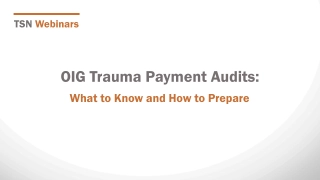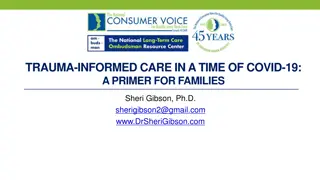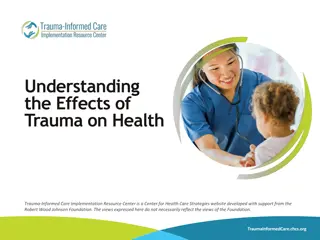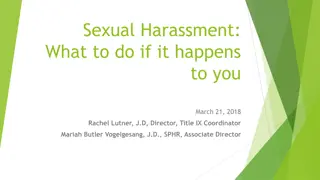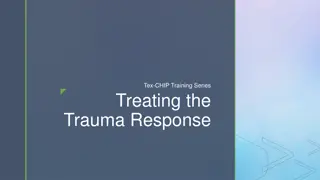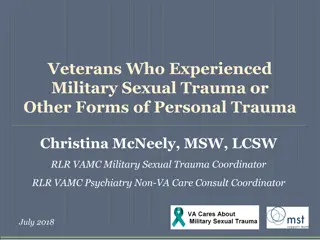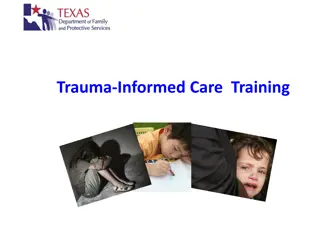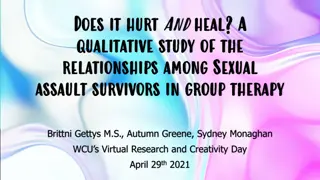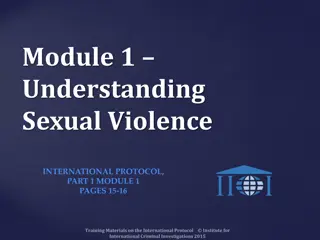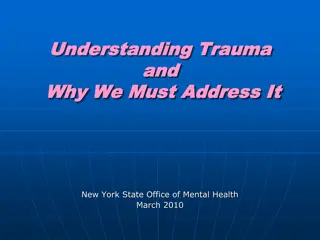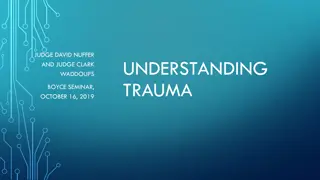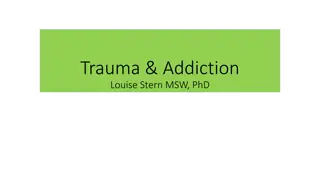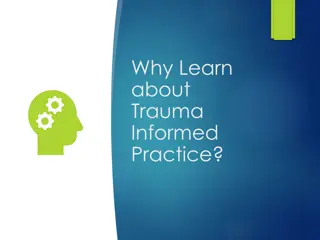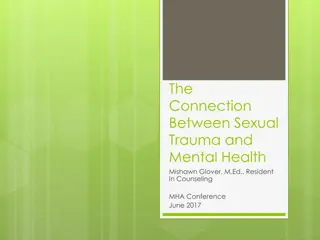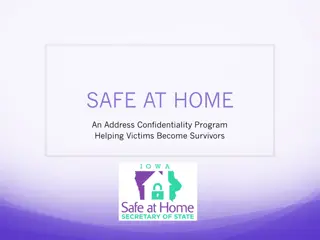Understanding Military Sexual Trauma (MST) and Supporting Survivors
This presentation by Dr. Alycia Zink delves into Military Sexual Trauma (MST), covering definitions, statistics, unique aspects in military settings, common reactions like PTSD, and available mental health treatments for survivors. Participants will gain insight into recognizing MST, understanding short and long-term reactions, and identifying treatment options for Veterans. The content sheds light on the types of MST experiences and emphasizes the importance of recognizing, seeking help for, and moving forward from MST.
Download Presentation

Please find below an Image/Link to download the presentation.
The content on the website is provided AS IS for your information and personal use only. It may not be sold, licensed, or shared on other websites without obtaining consent from the author. Download presentation by click this link. If you encounter any issues during the download, it is possible that the publisher has removed the file from their server.
E N D
Presentation Transcript
Military Sexual Trauma (MST): Recognition, seeking services, and moving forward Alycia Zink, PhD Military Sexual Trauma Coordinator/Women s Trauma Services Coordinator VA Puget Sounds Health Care System
Brief description of your presentation: This presentation will provide an overview of Military Sexual Trauma (MST) including definitions, statistics, and aspects of sexual trauma that are unique to military service. The presenter will also discuss common reactions to sexual trauma, including mental health conditions such as PTSD. Lastly, the presentation will provide a brief overview of the types of mental health treatments available for sexual assault survivors.
Objectives Participants will be able to specify aspects of sexual trauma that are unique to military settings Participants will be able to identify common short-term and long-term reactions to sexual trauma. Participants will be able to identify at least one form of treatment available to Veterans with MST.
Disclaimer Dr. Alycia Zink is a staff psychologist serving as the Military Sexual Trauma Coordinator and Women s Trauma Services Coordinator with the PTSD Outpatient Clinic at VA Puget Sound Health Care System, American Lake Division. The information presented here includes information obtained from the National MST Screening & Treatment Data and Maketheconnection.net.
Objective 1 WHAT IS MILITARY SEXUAL TRAUMA?
What is Military sexual Trauma (MST)? Military Sexual Trauma (MST) is a term used by the VA and refers to a broad range of experiences from sexual harassment to sexual assault. Sexual harassment is defined as repeated, unwanted verbal or physical contact that is sexual in nature and considered intimidating or threatening. Sexual assault refers to attempted rape, fondling or unwanted sexual touching, forcing a victim to perform sexual acts, or penetration of the victim s body, also known as rape.
Types of MST experiences: Threatening or offensive remarks about someone s body Threatening and unwelcome sexual advances Unwanted touching or grabbing Unwanted sexual penetration with an object or body part Physically forced into participation Unable to consent to sexual activities (under the influence of drugs, alcohol, etc.) Pressured or coerced into sexual activities
What is MST? The experiences listed on the previous slide must occur during the Veterans military service The identity of the perpetrator does not matter It does not need to have been reported to the military or civilian law enforcement
How common is MST: National Stats FY19 Gender Total Veterans Seen in a MST Screening Target Clinic Total Veterans Screened Percent of Veterans Screened Total Veterans Most Recent Screen MST+ Percent of Screened Veterans with Current Screen MST+ 461,219 455,304 98.72% 137,100 30.11% FEMALE 4,800,949 4,744,614 98.83% 78,679 1.66% MALE 5,262,168 5,199,918 98.82% 215,779 4.15% ALL GENDERS
Washington State MST Statistics FY19 Gender Total Veterans Seen in an MST Screening Target Clinic Total Veterans Screened Percent of Veterans Screened Total Veterans Most Recent Screen MST Positive Percent of Screened Veterans with Current Screen MST Positive Female 22,783 22,259 98.89% 8,638 38.34% Male 222,448 218,243 99.00% 5,508 2.52% All Genders 243,231 240,772 98.99% 14,146 5.88%
Puget Sound Area MST Statistics FY19 Current Screen MST+ Female Facility Total Male Seattle, WA 2,453 1,577 876 American Lake, WA 2,111 1,519 592 Bellevue, WA 519 325 194 Bremerton, WA 276 170 106 Mount Vernon, WA 352 218 134 South Sound, WA 177 110 67 North Olympic Peninsula, WA 105 58 47 Puget Sound, WA - Mobile 30 11 19
Some distinctions The term MST is used by the VA to describe experiences that may need medical or mental health treatment The term MST is not necessarily used by DoD or local law enforcement MST is not really a diagnosis , it is an event someone experiences Individuals may have different reactions to MST
Why is MST so common? In 2012, the CDC identified a number of risk factors associated with the perpetration of sexual violence, including: Individual Risk Factors Alcohol and drug use Lack of empathy General aggressiveness and acceptance of violence Preference for impersonal sex and sexual-risk taking Exposure to sexually explicit media Hostility towards women Adherence to traditional gender role norms Hyper-masculinity Community Factors Lack of institutional support from police and judicial system General tolerance of sexual violence within the community Weak community sanctions against sexual violence perpetrators Societal Factors Societal norms that support sexual violence Societal norms that support male superiority and sexual entitlement Societal norms that maintain women s inferiority and sexual submissiveness Weak laws and policies related to sexual violence and gender equity
Meachelles story https://www.youtube.com/watch?v=L2oqvq2t- Yo&feature=youtu.be
Anas story https://maketheconnection.net/stories/696
Objective 2 REACTIONS TO MST
Carlas Story https://www.youtube.com/watch?v=J-MWsoumLGU
Common Reactions and Symptoms Shock Fear Anxiety Anger Shame Guilt Depression Alcohol or substance use Feeling edgy Grief Physical pain/ injury Being easily startled Suicidal Thoughts Headaches Rapid heart beat Problems sleeping Difficulty breathing Poor concentration Feeling numb or detached Difficulties with trust Decreased self- esteem Lack of intimacy Changes in eating Nausea Nightmares
Is it normal? These symptoms are NORMAL reactions to difficult circumstances It is important to talk to someone if these reactions persist If seeking help, mental health providers will assist in discussing symptoms and to identify the type of treatment that is the best for the symptoms being expereinced
Symptoms and diagnoses Individuals may experience some or all of the symptoms noted previously Diagnoses are made based on the unique reactions each individual experiences Common examples of diagnoses following MST include: o Major Depressive Disorder, Post-traumatic stress disorder, Alcohol Use Disorder, Obsessive-Compulsive Disorder o Some individuals may have more than one diagnosis o These diagnoses are treatable
Veterans stories https://www.youtube.com/watch?v=2R-SqtAhkj8
Objective 3 WHAT IS BEING DONE FOR SURVIVORS?
What is the Department of Defense Doing? Information about the Department of Defense s current efforts related to sexual assault in the military is available at www.myduty.mil and www.sapr.mil 25
The two faces of the VA The Veterans Administration is actually made of two separate agencies: o Veterans Benefits Administration (VBA) o Veterans Hospital Administration (VHA)
What is VBA Doing? Veterans can file a claim to receive compensation for any MST-related injuries or disabilities that began or got worse during their military service The Veterans Benefits Administration (VBA) is responsible for handling these claims o More information is available at http://www.benefits.va.gov/BENEFITS/factsheets/serviceconnected/M ST.pdf Every VBA Regional Office has a male and female MST Coordinator who can assist Veterans with MST-related claims 27
What is VHA Doing? Universal screening Free MST-related care (medical and mental health) MST Coordinator at every VA Medical Center (VAMC)/Healthcare System (HCS) National MST Support Team, to continue improving VHA s response to MST Education and training of staff Outreach to Veterans 28
Meeting with a mental health professional Veterans need to first register with the VA closest to their home location Some facilities/sites have different ways of accessing mental health. In most sites, there is same day access meaning that a Veteran can walk in and request to see someone in mental health that day. Many facilities also have mental health providers on Primary Care Team or in Women s Specialty Clinics
Mental Health Treatment The first visit with mental health is called an intake . This appointment is designed to help ensure that that the provider is able to tailor treatment to the unique needs of each Veteran During this appointment, the provider will ask about background information and current symptoms. Based on this information, the provider will provide the diagnosis
Mental Health Treatment Based on the diagnosis and what the Veterans would really want to get from treatment, a treatment plan will be developed. The treatment plan will include the different types of treatments that will assist the Veteran in getting what they want from treatment. It will include options for an evidenced-based treatments specifically designed to treat the symptoms that are bringing the Veteran into treatment This is a collaborative process seeking to make sure that the available treatments meet the Veterans needs
Type of treatment available from the VA Psychotherapy o Group o Individual Medication Management Outpatient and Inpatient
Evidenced Based Treatments for PTSD Prolonged Exposure https://youtu.be/rHg_SlEqJGc Cognitive Processing Therapy https://youtu.be/Jqj5zDbkPxY
Other psychotherapies with promise DBT ACT Narrative exposure EMDR
Roberts Story https://maketheconnection.net/stories/735
Washington State VA MST Coordinators Spokane VAMC Dawn Gray, LICSW 4815 N Assembly St (BHS-116) Spokane, WA 99205 (509) 434-7281 Dawn.Gray3@va.gov Walla Walla, WA 99326 (509) 946-1020 Eric.Hollen@va.gov Alycia Zink, PhD VA Puget Sound HCS 9600 Veterans Drive SW (61-116A) Tacoma, WA 98493 (253) 583-3568 Alycia.Zink@va.gov Julia Sewell, LICSW VA Puget Sound HCS 1660 S. Columbian Way (S- 116) Seattle, WA 98108 (206) 277-1816 Julia.Sewell@va.gov Jonathan M. Wainwright VAMC Eric Hollen, LMSW 77 Wainwright Dr
Washington (Seattle Regional Benefit Office) Rochelle Mantanona Rochelle.M.Mantanona@va.gov Robert Kohler Robert.Kohler@va.gov Eileen Jordan Eileen.Jordan@va.gov
Addittional Resources DoD https://www.safehelpline.org/ VA Make the connection http://vaww.mst.va.gov. Community https://www.findsafety.org/ #Notinvisible 1in6 https://www.nwnetwork.org/
Referrences Tharp, A.T., DeGue, S. Valle, L.A., Kathryn A. Brookmeyer, K.A., Massetti, G.M., Matjasko, J.L. (2012). A Systematic Qualitative Review of Risk and Protective Factors for Sexual Violence Perpetration, Trauma, Violence, and Abuse Volume: 14 (2), 133-167. Stander, V.A. & Thomsen, C.J. (2016). Sexual Harassment and Assault in the U.S. Military: A Review of Policy and Research Trends MILITARY MEDICINE, 181, 1-20. https://www.cdc.gov/violenceprevention/sexualviolence/riskprotectivefactors.html



